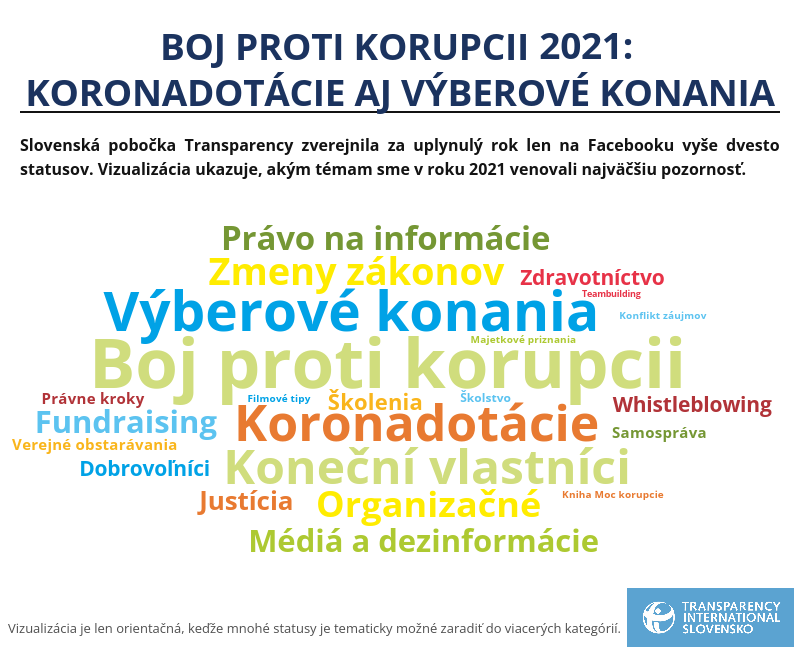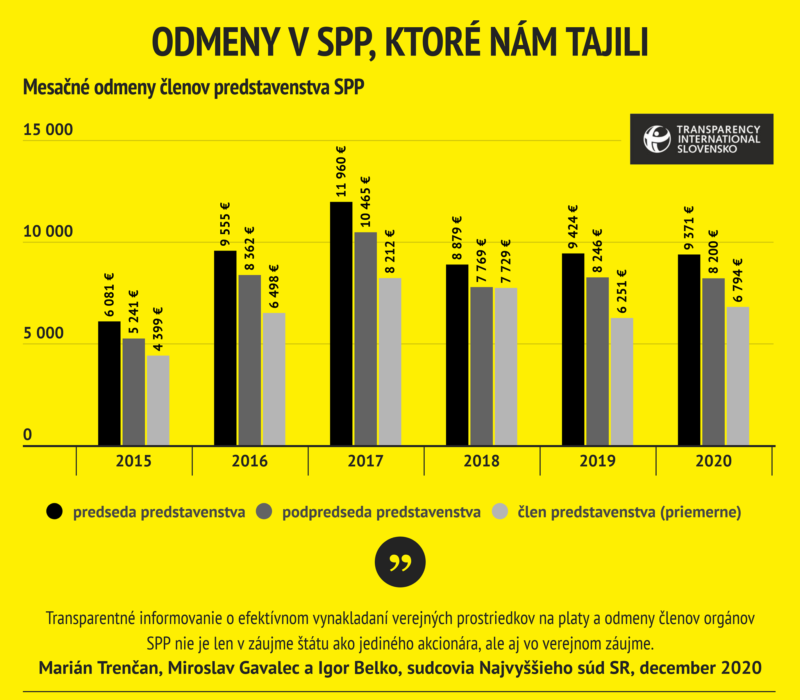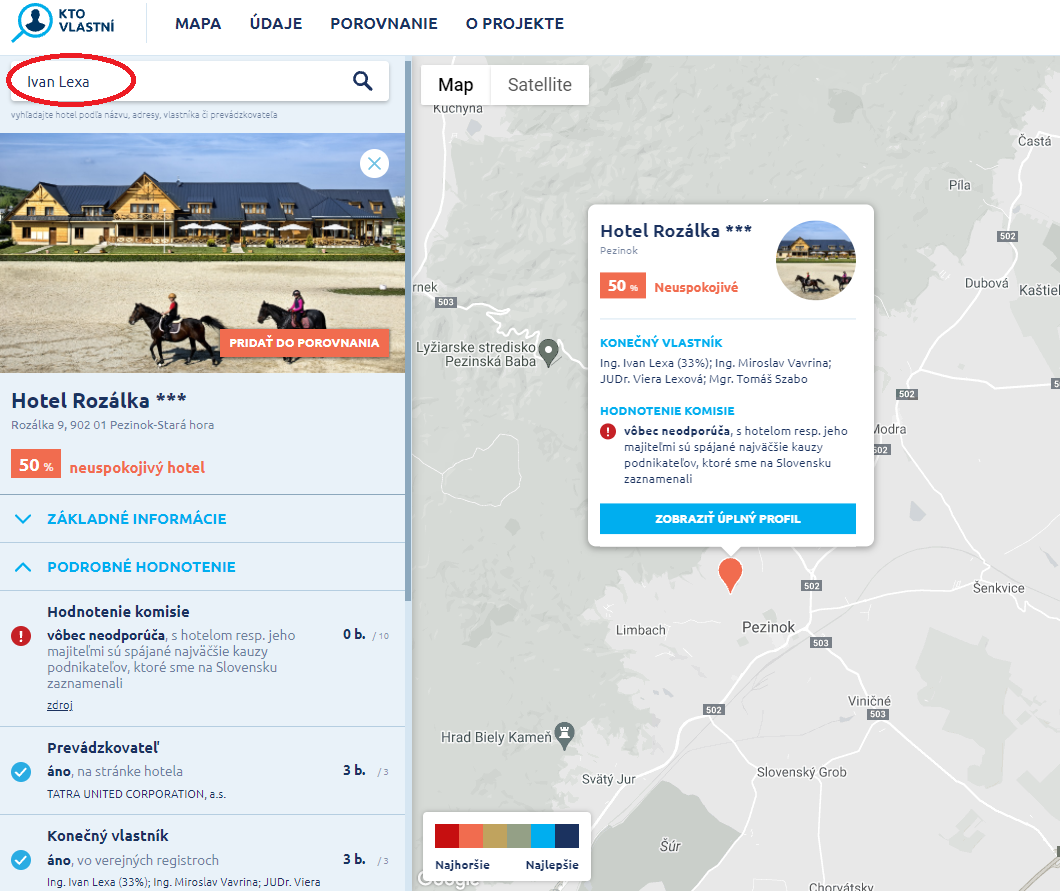The COVID-19 pandemic continued to have a major impact on almost all areas of our lives, including the fight against corruption. The problematic procurement of medical devices of the last year was replaced by suspicious uptakes of Corona subsidies or by the government’s laborious efforts to maintain its anti-corruption image in the second year of the pandemic.
The year 2021 certainly cannot be described as boring in terms of the fight against corruption. Because a lot of changes have taken place. The changes in top positions in the prosecutor’s office or the Police, the ongoing and discontinued investigations, the establishment of the Supreme Administrative Court and the new Whistleblower Protection Office or bringing forward the important legislation counting from the Amendment of the Act on Public Procurement to the Criminal Law. New challenges, risks and obstacles were again created by the ongoing Corona crisis, which has also been significantly reflected in the activities of the Slovak branch of Transparency International.
Risks are also being taken on Corona subsidies
For our anti-corruption association, the scrutiny of Corona subsidies has quickly become the issue no.1 in 2021. Due to the low transparency of their allocation, we started systematically asking various ministries for the respective information and publishing it since the first months of the pandemic. In 2021, our own data analysis uncovered several suspicious or apparently fraudulent claims.
Whether it was Hotel Magura in Prievidza, Pension Zefir in Bojnice, Bratislava city councilors, the co-owner of the Slovan hockey club and their small family tourist golden train or the millions for a offering jobs for temporary workers with likely white horses in the background. These cases alone involved more than €6 million in subsidies, some of which had been stopped or even clawed back after our findings were made public. In all cases, criminal complaints have also been filed, either by us or by the Ministry of Economy or the Department of Labor, Social Affairs and Family.
In September, in addition to the regular publication of tables with data from several schemes and together with the civic association Alvaria, we have created a unique Corona subsidy app. In this online register, anyone can easily find information on six different schemes with a total of 176 thousand applicants and over €2.4 billion in subsidies. Our online register has been used, for example, by colleagues from the Investigative Centre of Ján Kuciak in the search for the millions going to letterbox companies from the labor office in Pezinok, or by the anti-corruption foundation Zastavme korupciu in a report on foreigners who get their Slovak First Aid paid in the times of Corona while being abroad.

These practices and the produced public interest have also undoubtedly contributed to increased state activity in inspecting and recovering suspicious subsidies. However, a number of institutions are still lagging behind in terms of transparency. A specific case is the state-owned Eximbanka and the Slovak Guarantee and Development Bank (Slovenská záručná a rozvojová banka) which refuse to fully disclose data on the recipients of state aid in the form of Corona loans and bank guarantees. In case of Eximbanka, we therefore have also applied to the court.
Depoliticization of the state administration is stalled
As an anti-corruption NGO, we have devoted a lot of energy to personnel changes in the state administration in the past year. In program statement, promises to de-politicize and professionalize the public administration through transparent selection procedures have been among the most emphasized by the current government. Compared to the state capture of previous periods, we have undoubtedly seen progress in this area as well. Whether it was the filling of posts at the Constitutional Court, the Judicial Council, the prosecutor’s office, Fiscal Council, the Financial Administration, or some state companies. For several of them, the Government Office or ministers invited us as representatives of the public to the selection committees which we appreciate.
“However, we have also continued to witness the filling of posts primarily based on party preferences, without proper selection, consideration of professional qualifications or moral integrity of the candidates. And above all without sufficient public scrutiny,” we wrote at the same time in October 2021 in a joint call made by NGOs to Prime Minister Eduard Heger.
There were many examples – from filling the heads of district offices, the directors of labor offices, state hospitals or the mining office board to the heads of state companies and enterprises such as the public health insurance company (Všeobecná zdravotná poisťovňa) or water economy building company (Vodohospodárska výstavba).
The tip of the iceberg was the disregard of two open competitions for the head of the corruption scandal-tainted Slovak Land Fund (Slovenský pozemkový fond), where the Prime Minister directly appointed former MP of OĽaNO, Ján Marosz, or non-transparent open competition for the head of the Antimonopoly Office in which the only candidate close to Richard Sulík, the Minister of Economy and head of the SaS coalition party, applied.
However, we were also disappointed, for example, by the resigned attitude of the Ministry of Culture towards the opposition of Sme rodina coalition party to depoliticize the election of the head of RTVS.
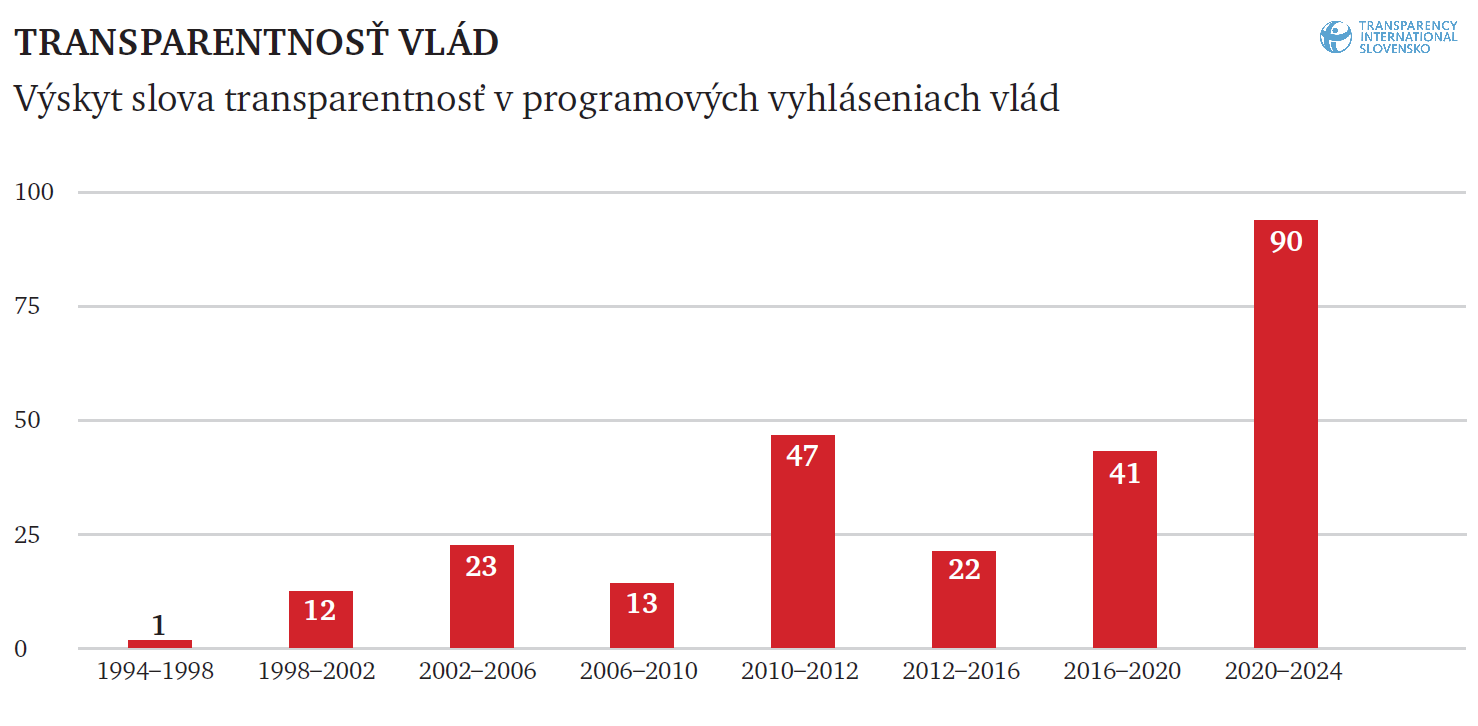
At the end of November, these and other cases, together with colleagues from other NGOs, led us to request a meeting with the Prime Minister. In our opinion, he should face up to the problematic practice of “fictitious tenders only” and demand a return to the promises of transparency made in the program statement from his colleagues in the government. The first meeting with his apparatus took place just before Christmas, followed by a second meeting directly with the Prime Minister at the beginning of the year. We will keep you informed of the outcome.
Anti-corruption torment
The pandemic- and strife-ridden, unpopular government, which initially obtained its mandate in part because of its strong demarcation against corruption practices of the past, has been able to build on this ethos only partially. While some progress is indeed visible in several areas, the government has so far fallen rather short of expectations on many of its promises. And it was far from just an embarrassing selection process. Definite changes in the legislation on proving the origin of assets, material liability of public officials or lobbying are still pending. However, we at Transparency were mainly concerned about changes or bad practices aimed at limiting public scrutiny.
From our point of view, this was undoubtedly the first version of the amendment of the Act on Public Procurement from the work of the Deputy Prime Minister from Sme Rodina party, Štefan Holý. This was intended to get up to a billion euros a year out of public scrutiny by shifting the limits for the free allocation of contracts. Together with other NGOs, we have raised a collective objection, against such a proposal which was supported by almost five thousand citizens. Holý finally withdrew his proposal after heavy criticism in May and in the autumn, a compromised version has been passed which he prepared together with the head of the Office for Public Procurement, Miroslav Hlivák. Although it has increased the limits for non-competitive purchases and limited the possibilities for objections, it was more lenient compared to the original proposal.

We have also observed a worrying practice in responses under the Act on free access to information and on amendments and supplements to certain acts (Freedom of Information Act). Information such as travel exemptions for cabinet members during the lockdown, minutes of pandemic committee meetings, or the Public Procurement Office’s decision that the Administration of State Material Reserves had violated the law when purchasing the antigen tests was not accessed even after a ping-pong of requests and denials.
Public pressure, on the other hand, worked for the contract on the purchase of the Russian vaccine Sputnik V and was finally disclosed by the Ministry of Health two months after our first “enquiry sheet” (Request for disclosure of information). After years, we have also managed to bring a lawsuit with the second largest 100% state-owned joint-stock company, Slovenský plynárenský priemysel (SPP) to a successful conclusion. SPP had to disclose the remuneration of its managers of the Board of Directors and the Supervisory Board.
Unfortunately, the unfavorable position of information seekers who are often only able to access the requested data after many years of court battles will not be greatly improved by the currently prepared amendment of the Act on free access to information (Freedom of Information Act). The Department of Justice has resigned to amend the Freedom of Information Act on a large scale, although it has had it ready in a drawer for years.
Minister Mária Kolíková (SaS party) added at least a few changes from the government’s program statement to a small amendment aimed primarily at harmonization with European legislation, such as the extension of the information obligation for state-owned companies. However, it has postponed addressing a number of more serious shortcomings. We fear that pushing through a major amendment will become increasingly difficult as the divisions in the coalition grow and elections approach. Therefore, Transparency, together with our colleagues from the third sector, will try to convince the Ministry and deputies about at least the most important changes when the current amendment is presented.
Who owns Slovakia
The year 2021 was significant from the point of view of our association, precisely because we opened a completely new, but important social topic for us. In June, we have managed to launch the portal KtoVlastni.sk with a pilot map monitoring the owners of the vast majority of Slovak hotels. Our experience with our own dilemmas when we received invitations to conferences in the hotels of Široký, Brhel and Lexa family led us to the idea of a project focused on ethical purchasing in the segment of tourism industry, especially accommodation.
When choosing a facility for a holiday, a corporate seminar or a wedding, and besides the price, service and environment, the conviction that the reputation of the hotel owners is for some clients very important as well was confirmed by the representative public opinion poll. According to the poll, more than a third of people would completely stop visiting a hotel after they learn that it is owned by a person who has got rich on fraud and corruption. For almost two-thirds of people, the information that the hotel is owned by a person associated with criminal activity would be a barrier.
Our analysis of ownership structures of more than 600 Slovak hotels revealed that up to a quarter of them are owned by businessmen referred to in the media as oligarchs and privatizers. On the portal KtoVlastni.sk you can also find links to possible cases in the public eye, as well as information about tax havens behind their companies or their debts to the state. For all the accommodation facilities, you will also find an assessment carried out by a committee of renowned analysts and investigative journalists, including long-time Transparency director Gabriel Šípoš who came up with the idea first.
We continue to unravel the ownership structures of tourism facilities after his departure from Transparency and soon, thanks to his successful crowdfunding campaign, we are preparing to expand the portal with information on the ownership background of Slovak ski resorts, aquaparks, spas and thermal pools, golf resorts and other recreational complexes.
Justice and self-government
We have also paid attention to other key areas of public life over the past year, whether it is the judiciary seeking to cleanse itself, or local government preparing for its first joint municipal and regional elections. In the judiciary, we consider the Supreme Administrative Court being fully operational to be good news, with important areas ranging from financial, tax and environmental law to electoral complaints and actions for breaches of the Freedom of Information Act gradually coming under its jurisdiction.
Faith in the cleansing process in the judiciary, the prosecutor’s office and the police has been undermined by conflicts in the forces, and the election of new General Prosecutor Maroš Žilinka is disappointing so far. We applauded his election, but he has embarked on a series of controversial decisions in office which he has unfortunately failed to explain credibly to the public. On the contrary, the new special prosecutor, Daniel Lipšic, was not our favorite during the public hearing because of his many years in politics and possible threat from causing conflicts of interest. However, we welcomed his election as a guarantee that the prosecution of big corrupt practices will continue in Slovakia for the next seven years, which is undoubtedly good news after the miserable double tenure of his predecessor Dušan Kováčik.
We consider the problems with suburban bus transport in the Bratislava region to be the story of the year in the local government. Unlike attempts in other regions, the Bratislava region managed to organize a real bidding procedure and achieve significant savings. In the end, however, there was little time left for a smooth takeover of the entire transport giant by a new company, which failed to sustain enough drivers.
Transparency has therefore looked at how tenders for suburban bus transport providers are going in other regions. Unfortunately, our conclusion was not very pleasing. Almost all the regions are struggling with considerable difficulties and delays, in some cases even risking annulment of contracts. The most complicated situation is currently in the Košice region, where the bidding process was not completed by the end of the year and they will probably have to proceed to a very questionable extension of contracts with the current carriers.
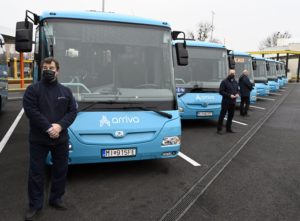
We are preparing larger analyses on local and regional self-government in the upcoming months. The first will be a major evaluation of the objectivity and public character of the city hall newspapers which, especially before the elections, are seen by some mayors as a tool for their own election campaign covered by public funds. Our colleagues have therefore been scouring hundreds of editions of city hall newspapers for several weeks now, and we will soon publish the results on the portal
Non-governmental value vs. money
As we wrote in the introduction, 2021 was by no means a dull year in terms of the fight against corruption. It was also dynamic for Transparency, not only because of all the activities mentioned above and many others, but also because of a number of organizational and staff changes. We are closing the year with nine employees (some with reduced hours) and a budget of roughly 240 thousand euros. The suspicious or fraudulent Corona subsidies alone that we highlighted at the beginning of the article and that are being investigated by the police, thus represent 25 times this value.
But Transparency is not just a few people from a run-down office building in the wider center of Bratislava. In 2021, our work was supported by over 400 individual donors and 70 volunteers, and hundreds of active citizens from all over Slovakia who participated in our trainings. Thanks to all the institutional or corporate donors who have supported us in our fight against corruption, waste and abuse of power.
We will certainly not be bored in 2022 either. In addition to the above mentioned activities, in connection with local and regional elections, we are also planning to monitor election campaigns or traditional transparency rankings in self-government regions and in hundreds of the largest local governments. We are working on a new evaluation of judges, preparing analyses of the public sector partners’ register, public procurement register, or updating data on the activities of prosecutors’ offices. We further intend to monitor the allocation of Corona subsidies, bidding procedures, legislative steps and government failures. Moving on, let’s keep our fingers crossed!
Michal Piško
Join us by supporting us financially, and let Slovakia not lose heart in the fight against corruption even in 2022. Thank you!
